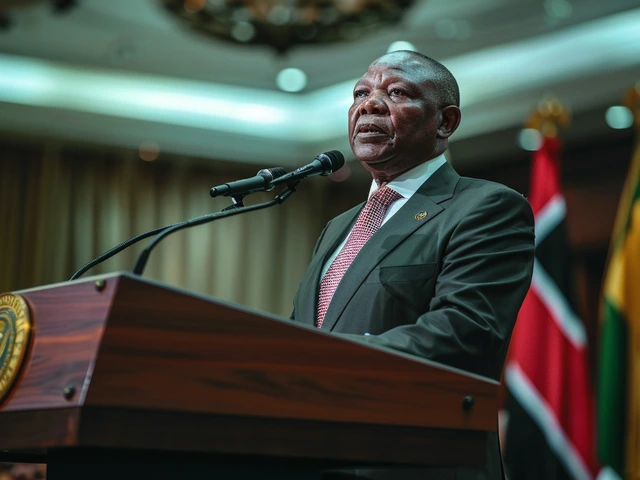The South African rand slipped by 0.9%, reaching 18.1275 against the dollar amidst growing anticipation for President Cyril Ramaphosa to reveal his new cabinet lineup. This decline comes at a critical juncture for the country, as markets keenly await to see how the new government will be structured, particularly after the African National Congress (ANC) lost its parliamentary majority for the first time in a generation. The ANC, now forming a coalition with nine other parties, faces significant scrutiny from investors as they strive to craft a cabinet capable of steering the nation’s economic and political future.
The formation of a government of national unity has introduced complexities that were previously unseen in South African politics. The perceived internal friction between the coalition partners has added a layer of uncertainty that has trickled down to the financial markets. Analysts point out that much of the rand's recent decline is a reaction not only to this uncertainty but also to a technical market correction. As South Africans and international investors await Ramaphosa's announcement, the stakes couldn’t be higher. The choice of cabinet members will likely demonstrate how well the ANC can balance inclusivity with the need to instill confidence among investors.
One of the key players in this new coalition is the pro-business Democratic Alliance (DA), which has garnered investor hopes that their participation will prompt economic reforms. Investors and financial analysts are advocating for the ANC and DA to hold dominant roles within the cabinet. The ability of these two parties to work cohesively is seen as essential to promoting stability and fostering economic growth. President Cyril Ramaphosa has consistently declared that his administration's top priorities are economic growth and job creation, pledging to tackle South Africa's pressing economic challenges head-on.
Market reactions have been mixed leading up to the cabinet announcement. The Johannesburg Stock Exchange’s Top-40 index saw a rise of 1.2%, signaling cautious optimism among investors. Meanwhile, the benchmark 2030 government bond yield increased by 15 basis points to 9.835%, reflecting concerns over the long-term economic outlook. Analyst Danny Greeff of ETM Analytics observed that the crucial test for the ANC is to successfully marry inclusivity with the confidence of investors through strategic cabinet appointments.
In the background, the coalition formation has underscored the broader shifts in South African politics. Historically, the ANC has maintained a dominant position, but the recent election has reshaped the political landscape. This new coalition includes a diverse array of smaller parties, each bringing its own priorities and policy goals to the table. Navigating these differences will be challenging, but it’s a necessity if Ramaphosa's administration is to achieve stability and progress.
Economic Implications
The economic implications of the new cabinet are profound. The ANC-led coalition must address critical issues such as unemployment, poverty, and inflation. With the DA's pro-business stance, there is potential for policies that could attract foreign investment and stimulate economic activity. However, the challenge lies in ensuring that such policies do not alienate the coalition's more left-leaning members. Political inclusivity has to be harmonized with pragmatic economic strategies aimed at restoring growth and creating jobs.
Investor Sentiments
Investors are keenly observing South Africa's political developments, as they gauge the future direction of the country's economy. Stability in governance is a critical determinant of market confidence. A well-balanced, competent cabinet could reassure markets, while any signs of discord or inefficiency may exacerbate existing economic woes. South Africa's recent struggles with power shortages, labor unrest, and slow economic growth have highlighted the need for effective governance and sound economic policies.
External factors also play a role in shaping market reactions. Global economic conditions, shifts in commodity prices, and international market trends can influence investor behavior. Consequently, a well-articulated and transparent economic plan from the new cabinet could help cushion the South African economy from negative external shocks.

The Stakes for Ramaphosa’s Presidency
Ramaphosa’s presidency is arguably at a crossroads. His success or failure in navigating this coalition government will likely define his legacy. As he prepares to announce the new cabinet, the president must consider a wide range of factors. He needs to ensure that his chosen ministers are not only competent but also able to work across party lines. This delicate balancing act requires political acumen and a clear vision for the future.
Ramaphosa's pledge to prioritize economic growth and job creation comes at a time when South Africa's unemployment rate remains alarmingly high, particularly among young people. Effective measures to stimulate job creation will be essential in gaining public support and achieving long-term stability. Public sentiment is closely tied to economic conditions, and tangible improvements in people's lives will be crucial for Ramaphosa's administration.
As he makes his cabinet choices, Ramaphosa must also address issues of corruption and inefficiency within government institutions. Building a transparent, accountable administration is vital for restoring public trust and attracting investment. The new cabinet's ability to implement reforms and deliver results will be closely watched by both domestic and international audiences.
Potential for Economic and Social Change
The potential for significant economic and social change in South Africa is real. A well-functioning coalition government could implement policies that address pressing challenges such as inequality, healthcare, education, and infrastructure development. Effective governance can create opportunities for growth and development, benefiting all South Africans.
However, the path to meaningful change is fraught with obstacles. Political differences and competing interests within the coalition could hinder progress. The new government must demonstrate a unified commitment to addressing the nation's challenges and delivering on its promises. Clear communication and collaboration among coalition partners will be essential for achieving common goals and advancing the country's development agenda.
In this environment of political flux, the president's leadership is crucial. Ramaphosa's ability to inspire confidence, build consensus, and drive forward an ambitious agenda will be tested in the coming months. The choices he makes and the actions his administration takes will shape South Africa's trajectory for years to come.
The rand's recent dip may just be a temporary fluctuation, but it underscores the broader economic and political uncertainty facing South Africa. As the country looks to the future, the formation of a cohesive, capable government of national unity will be key to unlocking potential and driving progress. The eyes of the nation—and the world—are on Cyril Ramaphosa and his new cabinet, waiting to see how they will navigate the challenges ahead and seize the opportunities for growth and development.






Write a comment